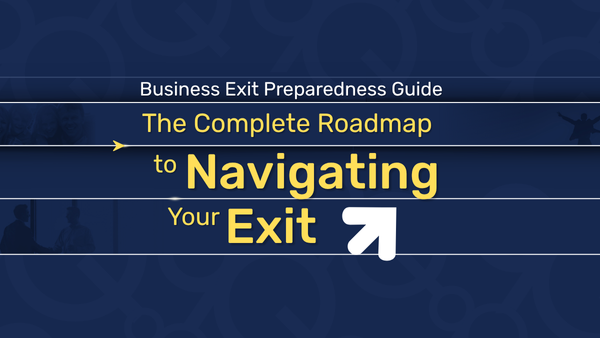When you’re ready to sell your business, one of the most critical decisions you’ll make is choosing the right buyer. Not all buyers are created equal. Each type has distinct motivations, advantages, and potential red flags that could make or break your deal.
After reviewing hundreds of businesses and facilitating numerous successful exits, we’ve seen firsthand how understanding your buyer can mean the difference between a smooth, profitable sale and a deal that falls apart. Here’s your complete guide to the buyer landscape, so you can target the right audience and negotiate from a position of strength.
Strategic Buyers: Industry Players Looking for Synergy

Who They Are: Companies already operating in your industry or related sectors seeking to expand their market reach, customer base, or capabilities.
What They Want: Immediate strategic value through synergies. They’re buying market share, technology, customer relationships, or geographic expansion, not just your financials.
Why They Pay Premium: Strategic buyers often offer the highest prices because they can realize immediate value through combining operations, eliminating redundancies, or cross selling to expanded customer bases.
Advantages:
- Typically willing to pay above market multiples for clear strategic value
- Experienced in M&A transactions, leading to efficient closing processes
- Have resources for long term investment in growth initiatives
- Can move quickly when they see strategic fit
Red Flags to Watch:
- Competitors fishing for information: Be cautious if they push for sensitive data before signing confidentiality agreements
- Integration heavy plans: May completely absorb your company, eliminating your brand, culture, and team structure
- Lowball offers from competitors: Direct competitors often offer the lowest prices, knowing your limited alternatives
Negotiation Strategy: Focus on quantifiable strategic value. Document how your customer relationships, market position, or capabilities will enhance their existing operations. Request detailed integration plans that preserve key elements important to you.
Private Equity Groups: Financial Buyers Seeking Growth

Who They Are: Investment firms that acquire businesses to improve operations and sell them at a profit, typically within 5 to 7 years.
What They Want: Strong cash flow, experienced management teams, and clear opportunities to enhance profitability through operational improvements or add on acquisitions.
Advantages:
- Bring significant capital and strategic expertise
- Often allow you to retain equity and benefit from future growth
- Professional, structured deal processes with clear timelines
- Valuable industry connections and resources
Red Flags to Watch:
- Inexperienced groups: Avoid firms without relevant industry experience or successful track records
- Unclear funding sources: Verify they have committed capital, not just promises
- Overly aggressive growth projections: Be skeptical of unrealistic promises about rapid expansion
Negotiation Strategy: Emphasize your management team’s capabilities and growth potential. Private equity firms invest in people as much as businesses. Consider negotiating for continued equity participation in future growth.
Individual Operators: Entrepreneurs Seeking Ownership

Who They Are: Individuals leaving corporate careers or successful entrepreneurs seeking their next venture, typically targeting businesses under $3 million in revenue.
What They Want: Stable income, personal fulfillment, and the opportunity to build something meaningful while maintaining work life balance.
Advantages:
- Largest pool of potential buyers for smaller businesses
- More likely to preserve company culture and legacy
- Flexible with deal terms (seller financing, extended transitions, earnouts)
- Often passionate about maintaining your business’s mission
Red Flags to Watch:
- Financial constraints: Heavy reliance on SBA loans or external financing increases deal risk
- Lack of management experience: Verify they have relevant business leadership background
- Emotional decision making: Watch for buyers who seem to change their minds frequently or make decisions based on feelings rather than facts
Negotiation Strategy: Highlight your business’s lifestyle benefits and growth potential. Be prepared to offer seller financing or gradual transition arrangements that reduce their upfront capital requirements.
Management Buyouts: Your Own Team

Who They Are: Your existing management team or key employees who want to acquire the business they’ve helped build.
What They Want: Continuity, job security, and the opportunity to reap the rewards of ownership in a business they already understand.
Advantages:
- Smoothest possible transition with minimal operational disruption
- Deep understanding of your business, customers, and challenges
- Emotional appeal of preserving your legacy exactly as you built it
- No learning curve or cultural integration issues
Red Flags to Watch:
- Financing challenges: Employees rarely have sufficient personal capital and may struggle to secure adequate funding
- Internal conflicts: The buyout process can create tension among team members who feel excluded
- Management inexperience: Technical expertise doesn’t always translate to ownership responsibilities
Negotiation Strategy: Structure deals with significant seller financing and performance based payments. Consider gradual ownership transitions that allow the team to prove their capabilities while reducing your risk.
Competitors: Market Consolidation Players

Who They Are: Direct competitors seeking to eliminate competition, gain market share, or acquire your customer relationships.
What They Want: Your customer base, market position, and the elimination of competitive pressure.
Advantages:
- Immediate understanding of your business value and market position
- May pay strategic premiums to eliminate competition
- Quick decision making due to industry familiarity
Red Flags to Watch:
- Information fishing: Competitors may use due diligence to gather competitive intelligence without serious buying intent
- Lowball offers: Often offer the lowest multiples, knowing you have limited alternatives
- Confidentiality risks: Failed deals leave them with valuable insights into your operations
Negotiation Strategy: Insist on ironclad confidentiality agreements and limit information sharing until serious intent is proven. Consider working through intermediaries to maintain negotiating leverage.
Corporate Refugees and Career Shifters

Who They Are: Senior professionals or recent retirees seeking meaningful second careers through business ownership.
What They Want: The satisfaction of entrepreneurship combined with the financial security of an established business.
Advantages:
- Bring extensive managerial and industry experience
- Financial stability from savings or retirement funds
- Commitment to maintaining business reputation and culture
- Often seeking long term ownership rather than quick flips
Red Flags to Watch:
- Underestimating complexity: May not fully grasp the day to day challenges of running a small business
- Risk aversion: Excessive caution during due diligence can slow or derail deals
- Part time mentality: Ensure they’re committed to full time involvement
Negotiation Strategy: Emphasize the business’s stability and established systems. Provide detailed operational documentation to build confidence in their ability to manage successfully.
Family Offices and High Net Worth Investors

Who They Are: Wealth management entities for affluent families or individual high net worth investors seeking portfolio diversification.
What They Want: Stable, predictable returns with minimal day to day involvement in operations.
Advantages:
- Significant financial resources enabling quick, all cash transactions
- Long term investment perspective focused on stability
- Professional approach with experienced advisors
Red Flags to Watch:
- Slow decision making: Internal approval processes can extend timelines significantly
- Operational inexperience: May lack hands on business management expertise
- Complex structures: Overly complicated deal terms or governance arrangements
Negotiation Strategy: Focus on your business’s predictable cash flow and growth potential. Be prepared for thorough due diligence and potentially longer decision timelines.
How to Identify Your Ideal Buyer

Consider Your Priorities:
- Maximum sale price vs. legacy preservation
- Quick closing vs. optimal terms
- Hands off transition vs. continued involvement
- Employee retention vs. operational flexibility
Match Buyer Type to Goals:
- Want top dollar? Target strategic buyers or private equity
- Value legacy preservation? Focus on individual operators or management buyouts
- Need quick cash? Consider family offices or corporate refugees
- Prefer low risk deals? Work with experienced acquirers like established private equity firms
Red Flags That Apply to All Buyer Types

Regardless of buyer category, watch for these universal warning signs:
- Reluctance to sign confidentiality agreements
- Vague or evasive answers about financing
- Pressure for sensitive information before serious commitment
- Unrealistic timelines or promises
- Lack of references from previous transactions
- Frequent changes in terms or requirements
Your Strategic Advantage

Understanding buyer motivations gives you tremendous negotiating power. When you know what drives each type of buyer, you can:
- Target your marketing to attract the right prospects
- Structure initial discussions to highlight relevant value drivers
- Negotiate from a position of knowledge rather than hope
- Avoid buyers whose goals conflict with your priorities
- Build competitive tension between different buyer types
The Bottom Line
Your business represents years of hard work, sacrifice, and dedication. Choosing the right buyer isn’t just about getting the highest price. It’s about finding someone who respects your legacy, treats your team fairly, and has the capability to successfully operate your business.
Take time to understand each potential buyer’s true motivations, financial capacity, and operational experience. Ask tough questions, verify their claims, and trust your instincts. The right buyer will be transparent, respectful, and aligned with your vision for your business’s future.
Remember, you only get one chance to sell your business. Make it count by choosing a buyer who shares your values and has the resources to close successfully.
Ready to identify your ideal buyer? Download our free “Essential Questions to Ask Any Potential Buyer” worksheet to ensure you’re evaluating prospects effectively. We’ve also compiled a comprehensive Exit Readiness Checklist to help you prepare for serious buyer conversations.
At 9Q Exit, we’ve worked with all types of buyers and can help you navigate these relationships strategically. Whether you’re just starting to consider your exit or ready to engage with potential buyers, we’re here to provide objective guidance that protects your interests.







